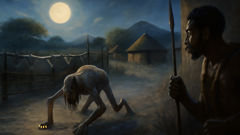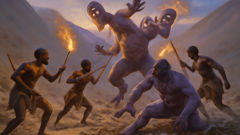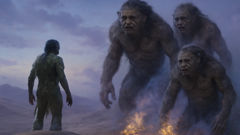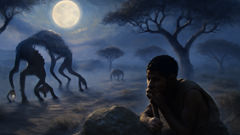Introduction
The Kalahari Desert stretches endlessly, a sea of ochre sand and sun-bleached bones, dotted with clusters of wiry grass and solitary camelthorn trees twisted by centuries of wind. Even in daylight, the desert holds secrets in its silence—the whisper of ancient spirits, the tracks of animals erased as quickly as they appear. But as dusk pours its bruised purples and golds across the savanna, the landscape shifts. Shadows lengthen. The wind hushes. In the far distance, a hyena’s cackle echoes, hinting at the edge between the known and the unknowable. For the Khoikhoi people who have called this place home for generations, the night belongs not just to lions and leopards, but to older, more cunning beings: the Aigamuxa. These are monsters of legend, spoken of in quiet voices around the fire. No ordinary predators, the Aigamuxa appear as tall, gaunt figures with sun-hardened skin, their movements uncanny, almost human, almost beast. Their most terrifying trait is their eyes—set not in their faces, but on the soles of their feet, forcing them to contort and bend, to crawl or walk on hands in order to see the world. It is said they hunt by scent and sound, but if they catch a glimpse of you, even upside down, you are lost. Children know to heed their mothers when they say not to wander after sundown. Herdsmen keep their flocks close, whispering prayers to the ancestors. And sometimes, in the thick hush before dawn, the brave or foolish venture out, testing fate against the monsters that have haunted their people’s dreams for centuries.
The Scent of Danger
Long ago, when the world was new and stories traveled on the wind like seeds, there lived a young herder named //Khaeb. He was slender and quick, his skin the color of burnt earth, his eyes sharp as a springbok’s. Each morning, he led his family’s cattle to the distant grasslands beyond their village, where water hid beneath cracked stones and the sun scorched both body and spirit. His father, //Homan, had taught him to read the desert’s language—the way clouds cast moving shadows, how ostrich tracks told of danger, which shrubs hid thorns sharp enough to pierce a goat’s hoof. Yet there were some lessons even fathers could not teach.

For as long as //Khaeb could remember, his grandmother’s stories had wound through the fabric of every day. She spoke of a time when monsters roamed free, when the Aigamuxa feasted on the careless and vanished into mirages at sunrise. To a child, the tales were both thrilling and distant—a warning wrapped in fantasy. But on the night when the stars seemed too bright and the jackals barked for too long, //Khaeb realized the desert’s stories lived and breathed beside him.
It began with the wind shifting. That evening, as //Khaeb tended his cattle, a foul stench drifted from the dunes—a mixture of rotting meat and wild garlic. The herd grew restless, lowing and stamping, their eyes rolling. //Khaeb scanned the horizon and saw nothing but endless sand and a dying sun. Yet every hair on his arms stood up. As the last rays faded, he gathered the herd and made for home, his every step quickened by the feeling of being watched.
That night, his dreams were troubled. He saw shadows with too many limbs, heard whispers that sounded like bone scraping bone. In the morning, he found a single hoof print near the cattle pen—far larger than any antelope’s, pressed deep into the earth, and ringed by odd, claw-like marks. He showed it to his father, who grew silent, tracing the edges with a shaking finger. "Keep close to the fire after dark," his father warned. "And never look back if you hear footsteps behind you."
But fear was a slow river, carving its path over days. The herd grew thin and nervous. Sometimes a cow would vanish overnight, its only trace a drag of blood leading into the sand. The elders spoke of drought and lions, but //Khaeb’s grandmother shook her head, muttering about the Aigamuxa returning. No one wanted to believe her—until the night when a hunter failed to come home, and his tracks ended where the ground was churned and gouged by something large that moved on all fours.
With each disappearance, the village’s fear deepened. Men began setting traps around their kraals. Women brewed bitter herbs to ward off evil. //Khaeb, restless and angry at his own helplessness, decided to watch for the creature himself. Armed with only a spear and his father’s battered shield, he waited near the cattle pen as darkness spilled across the land.
He almost missed it—a flicker of motion against the dunes, a figure moving with uncanny grace and a strange awkwardness. It crawled close to the ground, limbs too long, body gaunt. And then, as the moon slipped from behind a cloud, he saw it stand: a tall shape, naked except for a ragged animal skin draped over its shoulders. Its head hung low, and its feet…he squinted, disbelieving. Where its toes touched earth, two glistening eyes blinked back at him, shining with intelligence and hunger.
The Aigamuxa had come to hunt.
Eyes on the Soles, Shadows in the Sand
//Khaeb froze, heart hammering so loud he feared it would draw the monster’s gaze. The Aigamuxa sniffed the air, its nostrils flaring as it swung its head from side to side. Its mouth was a slash of darkness, filled with broken teeth. It shuffled forward, hands digging grooves in the sand, eyes on its soles flicking open and shut like pale lizards. He realized suddenly that the creature was nearly blind at night unless it bent all the way over to look between its own legs—a comical movement if not for the way it radiated hunger and cunning.

As it drew closer to the herd, //Khaeb noticed something stranger still. The cattle, usually quick to panic at any predator, stood mesmerized. The Aigamuxa whispered to them in a hoarse, clicking tongue, and though //Khaeb could not make out the words, the tone was almost soothing. One cow stepped forward, snout quivering. The monster reached out and stroked its neck with a gentle hand before opening its jaws wide and clamping down. The sound of bone crunching echoed through the night.
Unable to move, //Khaeb watched in horror as the creature feasted. When it was done, it wiped its mouth on its wrist and began to shuffle away, dragging the carcass behind it. Only then did //Khaeb find his voice—he let out a cry so piercing it startled even the moonlit silence. The Aigamuxa whipped its head around, searching for the source. But because its eyes were on its feet, it had to contort itself, twisting its torso until it peered between its ankles. Its gaze met //Khaeb’s for a fleeting, terrifying second. The boy felt cold all over, as if that glance had stripped away his flesh and left only bones.
He fled to the safety of his family’s hut, stumbling and gasping. His father and grandmother listened to his tale with grim faces. "You have seen what few survive to tell," his grandmother said. She pressed a charm into his palm—a small stone carved with a spiral. "Carry this always. The Aigamuxa hate the scent of bitter aloe and strong spirits."
In the days that followed, //Khaeb became obsessed with the monster’s habits. He noticed how it followed the same trails each night, always circling the outskirts of the village. Sometimes he heard it muttering to itself, or singing strange songs that echoed between the dunes. He learned to recognize its stench before he saw its shadow. And he realized that it was not alone: sometimes he glimpsed two or three figures, moving together in a pack, communicating in low growls and clicks.
Fear gripped the village. No one dared go out after dark. Fires were kept burning all night. Livestock was penned inside thorn barricades. But the Aigamuxa were clever, waiting for windstorms to cover their scent or moonless nights to strike. One evening, a child disappeared. The elders called for a great hunt, but few were brave enough to join. //Khaeb volunteered, driven by guilt and a fierce need to protect his people.
The hunters tracked the monster’s prints for miles across the sand. They found half-eaten bones and scraps of hide. At dawn, they stumbled upon a hollow in the dunes—an Aigamuxa den. Inside lay gnawed skulls, bones arranged in strange patterns, and the sleeping forms of three monsters curled together like great hairless dogs. One had a necklace of teeth, another wore a patchwork cloak made from human skin.
The hunters attacked with spears and fire, but the Aigamuxa were swift. They leapt to their feet, contorting wildly to see their enemies. In the chaos, one monster was slain, its blood black and sticky as tar. The others escaped into the dunes, howling curses that echoed for miles.
But victory was hollow. The next night, the survivors came for revenge. They howled outside the village, throwing bones and stones, taunting the humans who dared challenge them. "You look with eyes in your faces," they mocked. "But we see what hides below."
The Courage of //Khaeb
The village was on the edge of panic. Each night, the Aigamuxa circled closer, their laughter and howls carrying on the cold wind. The livestock grew thin; the people thinner still. No one slept well. But //Khaeb refused to give in to despair. Remembering his grandmother’s stories, he decided to confront the monsters—not with weapons, but with wit and courage.

He prepared himself carefully. He coated his skin with bitter aloe sap until his eyes watered from the fumes. He strung dried calabash rattles around his waist so their clatter would confuse the monsters’ hearing. From his father’s stash, he took a flask of strong honey-wine, pouring some over his spearhead. Lastly, he tied his grandmother’s spiral charm around his neck.
That night, as the moon slipped behind a cloud and silence fell, //Khaeb slipped from his hut and followed the monsters’ tracks into the dunes. He crept as quietly as he could, though the rattles made stealth impossible. He needn’t have worried—the Aigamuxa were waiting for him. Three figures stood atop a sand dune, silhouetted against the stars, their heads hanging low, arms dangling, feet shifting nervously. Their eyes blinked from their soles with anticipation.
"Why do you come, child?" the largest hissed, its voice thick and guttural. "Do you offer yourself for our feast?"
//Khaeb steadied his voice. "I come to speak."
The monsters snickered. "Your kind runs and hides. Why do you not tremble?"
//Khaeb took a breath, remembering the old tales. "You are feared because you hide your eyes from the sun. But what if the sun saw you first? What if we made the desert too bright for you?"
The Aigamuxa recoiled, hissing at the mention of sunlight. One stamped its foot, blinking rapidly. //Khaeb seized his chance. He flung his honey-wine soaked spear at their feet. The alcohol burned in the sand, sending up acrid smoke. Then he rattled his calabash beads and chanted a prayer his grandmother taught him:
"O spirits of sand and thorn,
O wind that carries word and warning,
Blind these monsters’ hidden eyes,
Send them crawling into morning!"
The monsters howled in pain and confusion. The aloe scent stung their nostrils; the smoke clouded their vision; the rattles made it impossible to hear each other’s commands. //Khaeb circled them, using every trick he knew—throwing stones to distract them, darting close then leaping away.
He realized suddenly that the Aigamuxa’s strength was also their weakness. Their eyes could not see what was right behind them. He maneuvered behind the largest, slashing its heel with his stone knife. The monster screamed and fell, scrabbling helplessly in the sand. The others fled, wailing curses.
Victorious but shaken, //Khaeb returned to his village. The elders praised his courage and wisdom, and his story spread across the desert. The Aigamuxa would return—such monsters never vanished entirely—but now the people knew their weakness and how to defend themselves. Fires were kept burning even brighter. Aloe was planted around every kraal. Children learned not just to fear the darkness, but to face it with open eyes and clever minds.
As for //Khaeb, he grew into a leader known for his bravery and his respect for the old stories. He taught his children that monsters could be outwitted, that even the strangest terrors had their flaws, and that true courage was not the absence of fear, but the will to act in spite of it.
Conclusion
The story of the Aigamuxa lingers in Namibian dusk like the scent of rain on sand—part warning, part lesson, part reminder that courage often walks hand in hand with fear. The Khoikhoi people still tell of monsters who see with their feet and prowl where shadows are deepest. But they also remember //Khaeb, who stood against them not with brute strength, but with wit, tradition, and a willingness to face what others fled. In every whisper of wind through thorn trees, in every flicker of firelight across a child’s face, the legend is reborn: monsters may haunt the night, but it’s human ingenuity and heart that shine through the darkness. So when the desert grows silent and you sense unseen eyes upon you, remember—the greatest weapon against fear is knowledge passed from one generation to the next, and the bravery to trust your own steps beneath the moon.













